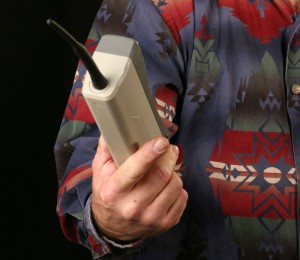 Call me old fashioned. I do not now, and never have in the past, owned a smartphone. Whether it was due to geographic isolation (the iPhone debuted after I'd moved 11,000 miles to the Indian Ocean), fear of being a too-early adopter, or simply an inability to rationalize the cost of a non-subsidized device, I have somehow resisted the siren song of the smartphone revolution.
Call me old fashioned. I do not now, and never have in the past, owned a smartphone. Whether it was due to geographic isolation (the iPhone debuted after I'd moved 11,000 miles to the Indian Ocean), fear of being a too-early adopter, or simply an inability to rationalize the cost of a non-subsidized device, I have somehow resisted the siren song of the smartphone revolution.
But that doesn't mean I'm stuck in the past. More than any of my contemporaries, I have embraced the post-PC concept with gusto. From my first attempts using an HP Mini 2140 netbook (great machine), through my awkward BlackBerry PlayBook (still love my 32GB unit) days to my present infatuation with rooted, customized Android tablets (thanks xda community!), I've seized every opportunity to put my 30+ year relationships with the "wintel" cabal behind me.
The ultimate test came this summer, which saw me staying for several weeks in my recently sold Palm Beach vacation home while awaiting the final closing documents. Armed with nothing but my trusty Acer Iconia, an external keyboard/mouse and a somewhat unreliable airbed, I pushed the edge of the envelope for post-PC living. And thanks to a combination of Skype, plentiful Wi-Fi hotspots and a simple burner phone, I was able to remain fully connected and even negotiate multiple offers (including a mountain of realtor paperwork), all without ever wishing for my own pocket full of smartphone Kryptonite.
And apparently I'm not the only one to feel this way. As CNET's Jessica Dolcourt points out in a recent article on tablets and flip phones, many users are foregoing smartphones in favor of my aforementioned feature phone/tablet combination. Like me, these users don't need the constant connectivity and absurdly expensive data plans that are the hallmark of the smartphone revolution. They use their phones as, well, phones. And for those times when they do need to get online -- to check email or look something up on the web -- they take advantage of the myriad of free, Wi-Fi hotspots that dot the modern urban/suburban landscape.
Useful tip for the occasionally connected: Can't find a Starbucks? Think Home Depot. Every store has free Wi-Fi. Ditto for Lowes, McDonald's and most shopping malls. Even my local Macys has dedicated public Wi-Fi, which is great for killing time while my wife browses the racks (no, dear, those pants don't make you look fat).
Of course, some users do need continuous connectivity. But even then, many are opting for 3G/4G radios that are integrated directly in their tablets (as opposed to tethering their devices to a separate smartphone). Again, the advantage is simplicity -- fewer devices to carry -- along with the cost savings of not having to pay for multiple data plans or tethering surcharges.
I know that if and when I do feel the need to be more connected, I'll opt for an integrated tablet solution or, barring that, a portable Wi-Fi hotspot device. And lest you picture me holding an enormous tablet up to my ear to make a Skype call, I have two words for you: Bluetooth headset (I'm amazed at how many people still trot out that same lame argument).
Does the future really belong to the smartphone? I'm not convinced. With so many new tablet options coming down the pike, in form factors (5 to 7 inches) that are more manageable on the go than the traditional 9-to-10-inch iPad and Android standard bearers, I'm feeling pretty good about my decision to sit out this paricular revolution.
And if I do get the urge to fire-off that "can't wait" note to that all important client, I'll do what I've always done: I'll send them a text message from my cheap, reliable feature phone.
Catch Randall C. Kennedy's analysis of tech trends every Tuesday and Friday here at BetaNews.
Photo Credit: mikeledray/Shutterstock

